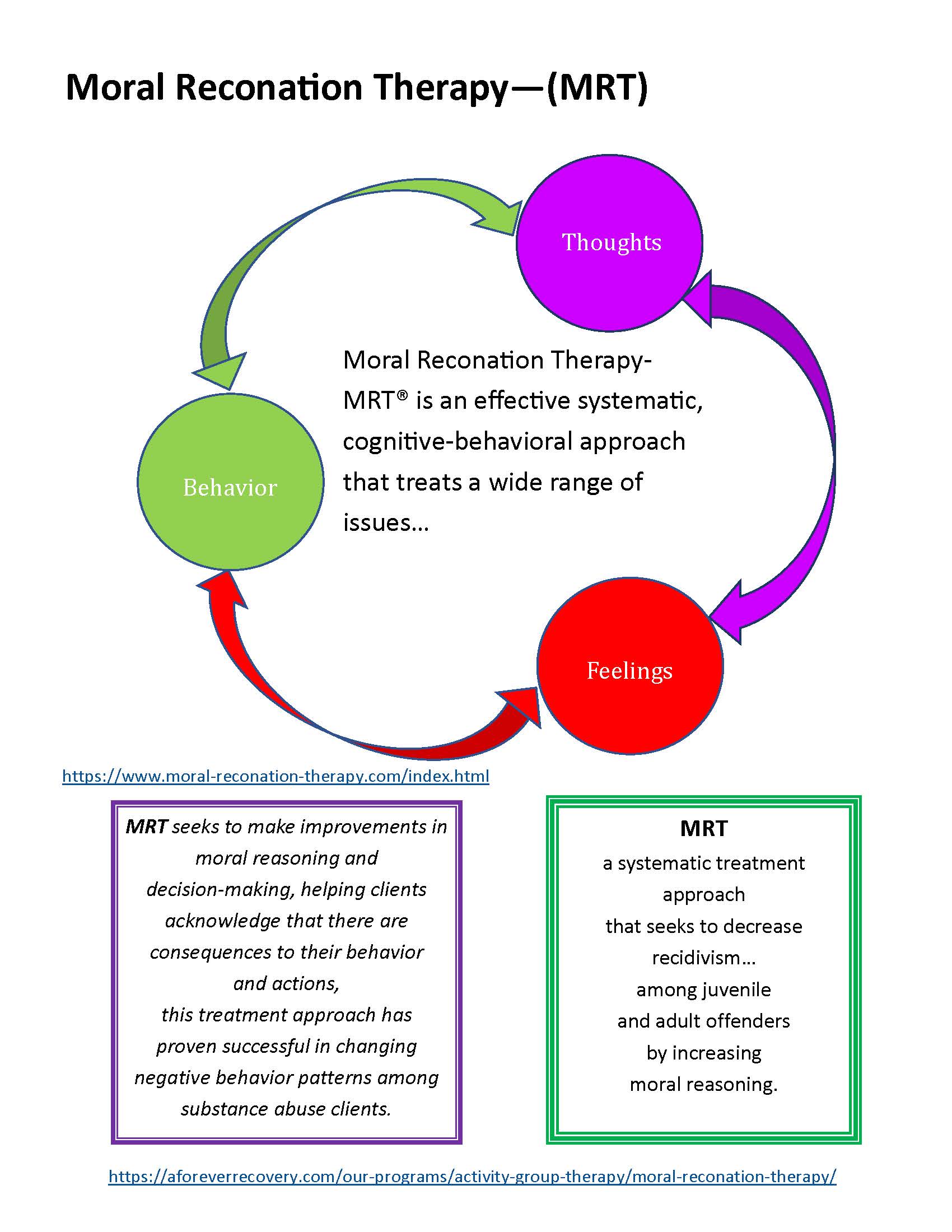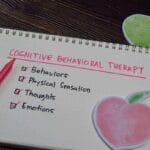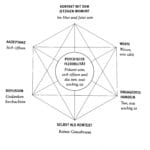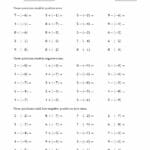Feeling trapped in a cycle of negative behaviors? Longing for positive change but unsure where to start? Moral Reconation Therapy (MRT) may be the answer. This comprehensive guide explores MRT—a proven, step-by-step program designed to facilitate lasting personal transformation. We’ll delve into how MRT works, its effectiveness, the sixteen steps involved, and how it differs from other therapies like CBT. Whether you’re a professional seeking effective tools or an individual striving for personal growth, understanding MRT could be life-changing.
Understanding MRT
What is Moral Reconation Therapy (MRT)?
MRT is a cognitive-behavioral intervention that helps individuals develop a stronger moral compass and make better choices. It’s particularly effective for those involved in the justice system, struggling with addiction, or facing other behavioral challenges. MRT aims to break free from negative patterns by targeting the underlying thoughts, beliefs, and attitudes that drive destructive behaviors. It empowers individuals to take control of their lives and build a brighter future.
How Does MRT Work?
MRT combines principles of Cognitive Behavioral Therapy (CBT) and moral development theory to address the root causes of problematic behavior. It works by:
- Restructuring Cognitions: Challenging and changing negative thought patterns that contribute to harmful actions.
- Enhancing Moral Reasoning: Developing a more mature and prosocial sense of right and wrong.
- Promoting Behavioral Change: Equipping individuals with the skills and strategies to make healthier choices.
This comprehensive approach addresses the “why” behind behaviors, leading to more profound and sustainable change. Similar to how arthrokinematics delves into the intricate movements within joints, MRT explores the complex interplay of thoughts, feelings, and actions.
Navigating the 16 Steps of MRT
MRT utilizes a structured 16-step program, offering a clear roadmap for personal growth. Each step involves specific exercises and activities, ideally guided by a trained therapist. Here’s an overview:
- Confronting Denial and Minimizing: Acknowledging past mistakes and taking ownership.
- Assessment of Current Relationships: Evaluating the impact of relationships on behavior.
- Identifying New Role Models: Seeking positive influences and mentors.
- Setting Personal Goals: Defining achievable and prosocial objectives.
- Examining Character Traits: Identifying strengths and weaknesses.
- Identifying and Coping with Negative Feelings: Developing emotional regulation skills.
- Understanding How Feelings Affect Behavior: Recognizing the link between emotions and actions.
- Increasing Self-Esteem: Building confidence and self-worth.
- Improving Problem-Solving Skills: Developing effective strategies for handling challenges.
- Developing a Positive Identity: Cultivating a sense of self and purpose.
- Building Support Networks: Creating a network of positive influences.
- Fulfilling Obligations and Responsibilities: Taking ownership of commitments.
- Managing Anger Constructively: Developing healthy anger management techniques.
- Choosing Healthy Pleasures: Engaging in activities that promote well-being.
- Maintaining Healthy Relationships: Building and nurturing positive connections.
- Developing Meaning and Purpose: Finding direction and motivation in life.
Who Benefits from MRT?
While initially developed for the criminal justice system to reduce recidivism, MRT’s benefits extend to a broader population. It can be valuable for individuals facing:
- Substance Abuse: Supporting recovery and maintaining sobriety.
- Anger Management: Developing healthier emotional regulation.
- Relationship Issues: Improving communication and conflict resolution skills.
- Personal Development: Fostering self-awareness, moral growth, and a stronger sense of purpose.
Finding an MRT Facilitator
Working with a qualified MRT facilitator is essential for maximizing the program’s benefits. Certified facilitators provide guidance, support, and personalized feedback throughout the process. Resources for finding a qualified professional include:
- Official MRT Website: moral-reconation-therapy.com
- Eagle Wing Books, Inc.: A publisher of MRT resources.
- Online Directories: Searching for “certified MRT facilitators” in your area.
- Local Mental Health Clinics and Community Centers: Many clinics offer MRT services.
MRT vs. Other Therapies
MRT and CBT: A Comparative Analysis
MRT shares some similarities with CBT but also has distinct differences. While CBT primarily focuses on changing current thoughts and behaviors to alleviate symptoms, MRT delves deeper into the underlying moral reasoning that drives those thoughts and behaviors. This focus on moral development makes MRT particularly effective for addressing issues related to decision-making, values, and long-term behavioral change. The table below summarizes the key differences:
| Feature | CBT | MRT |
|---|---|---|
| Primary Target | Thoughts & Behaviors | Moral Reasoning & Decision-Making |
| Focus | Present-focused, symptom reduction | Moral development, long-term behavioral change |
| Core Principle | Restructuring negative thoughts | Strengthening moral compass |
| Typical Application | Anxiety, Depression, Anger, PTSD | Addiction, Criminal Justice, Personal Growth |
The Effectiveness of MRT: What Does the Research Say?
Research suggests that MRT can be effective in reducing recidivism, particularly among incarcerated adults. A meta-analysis of multiple studies indicated positive outcomes in reducing re-offending rates. However, most research has focused on the criminal justice setting. More research, including randomized controlled trials (RCTs), is needed in diverse settings and populations to fully understand MRT’s overall effectiveness and long-term impact. Some researchers believe that individual factors and the quality of program implementation may influence outcomes. Evaluating pain, like with a PQRST pain assessment, helps understand the nature of the pain; similarly, assessing factors influencing MRT’s success is crucial.
Challenges and Future Directions
Implementing MRT effectively requires careful consideration of individual needs and program context. There’s no one-size-fits-all approach, and ongoing research is vital to refine best practices and tailor interventions for specific populations. Future research should explore:
- Long-Term Effects: The lasting impact of MRT on various life domains, such as family relationships and employment.
- Cost-Effectiveness: Comparing the cost-effectiveness of MRT to other interventions.
- Combined Approaches: The potential benefits of integrating MRT with other therapies.
Conclusion
MRT offers a promising path to positive change by addressing the underlying moral reasoning that influences behavior. While research supports its effectiveness in certain contexts, ongoing research is essential to further understand its potential and optimize its implementation. If you’re seeking lasting personal transformation, exploring MRT with a qualified facilitator may be a worthwhile journey.
- Unlocking 2-Letter Words with U: The Definitive Guide - April 4, 2025
- Unlock Words with the Letters THREE: Top Unscramble Tools 2025 - April 4, 2025
- Master Scrabble: X & Z Words for High Scores - April 4, 2025
















